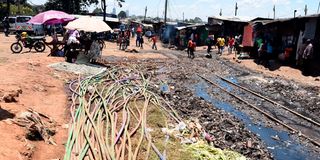Firm seals water pipe in Kibera to curb revenue loss

Plastic pipes connecting water to some of the houses in Kibera slums in Nairobi on March 23, 2020.
The Nairobi City Water and Sewerage Company Limited (NWSC) is set to seal off a two-kilometer-long water pipeline within the Kibera informal settlement as part of a strategy to curb revenue leaks through illegal connections or sabotage.
The company said the pipeline which connects to the adjacent middle-class Lang’ata area would be covered with a layer of concrete protection.
“The Nairobi City Water and Sewerage Company invites sealed tenders for the supply and delivery of premix concrete protection for the existing 600mm Lang’ata water pipeline within Kibera (2km)” the firm said in a tender call.
This comes weeks after the company unearthed massive theft of water in the informal settlement through illegal connections. Several suspects were arrested during a raid by law enforces and the illegal connections were removed amid concerns about revenue losses and health risks due to contamination of water in the main pipeline.
The concrete protection is expected to curb illegal connections and comes amid stepped-up efforts by NWSC to safeguard revenues across the city.
As part of a scheme to maximise revenues, the company in August revealed plans to install 10,000 new water meters to seal loopholes that deny it more than half of its revenue from supplies to city residents.
The utility has registered massive revenue shortfalls over the years due to the high amount of unbilled water—crippling its cash flow and operations.
The audit report for the company’s financial year to June 2020 said that while the firm produced 176.04 million cubic meters of water during that period, only 86.35 million cubic meters were billed to customers.
Read: Nairobi's water infamy
This means that 51 percent (89.69 million cubic meters) of the water was not billed resulting in revenue loss for the firm, which is double the 25 percent that the Nairobi Service Regulatory Board allows the firm to lose. This cost the company Sh4.75 billion in revenue.
“The significant level of non-renewable water is an indication of inefficiency and a lack of effectiveness in the use of public resources and, may negatively impact the company’s profitability and its long-term sustainability,” Auditor-General Nancy Gathungu said in a report.





